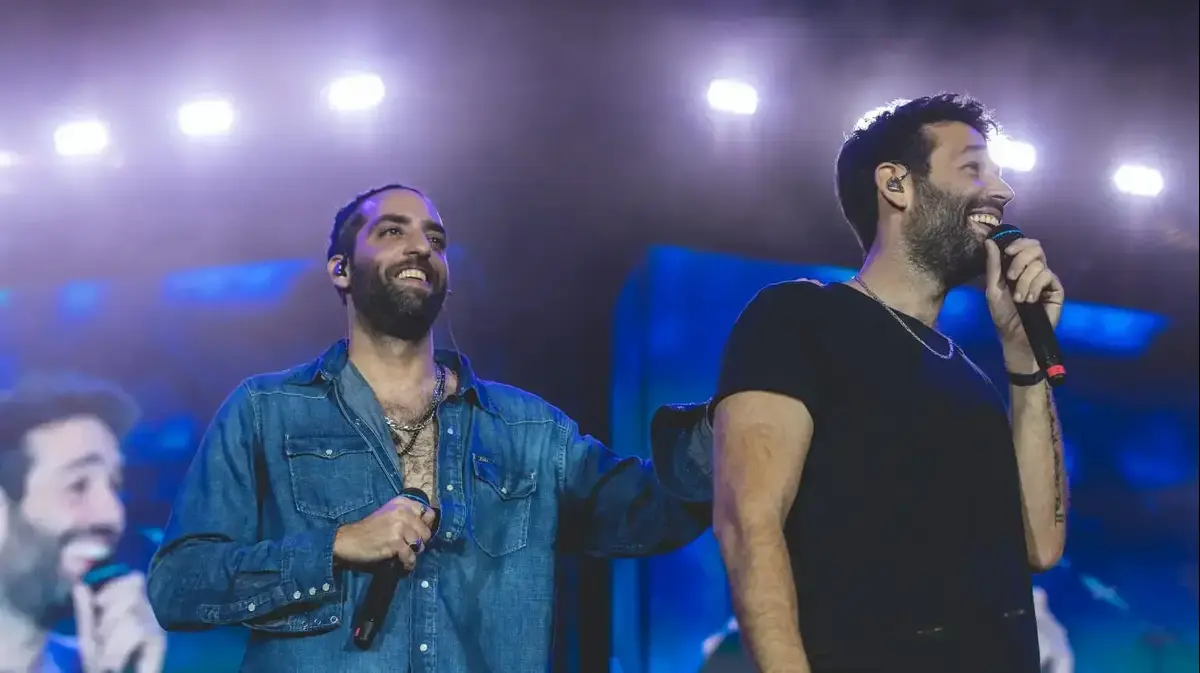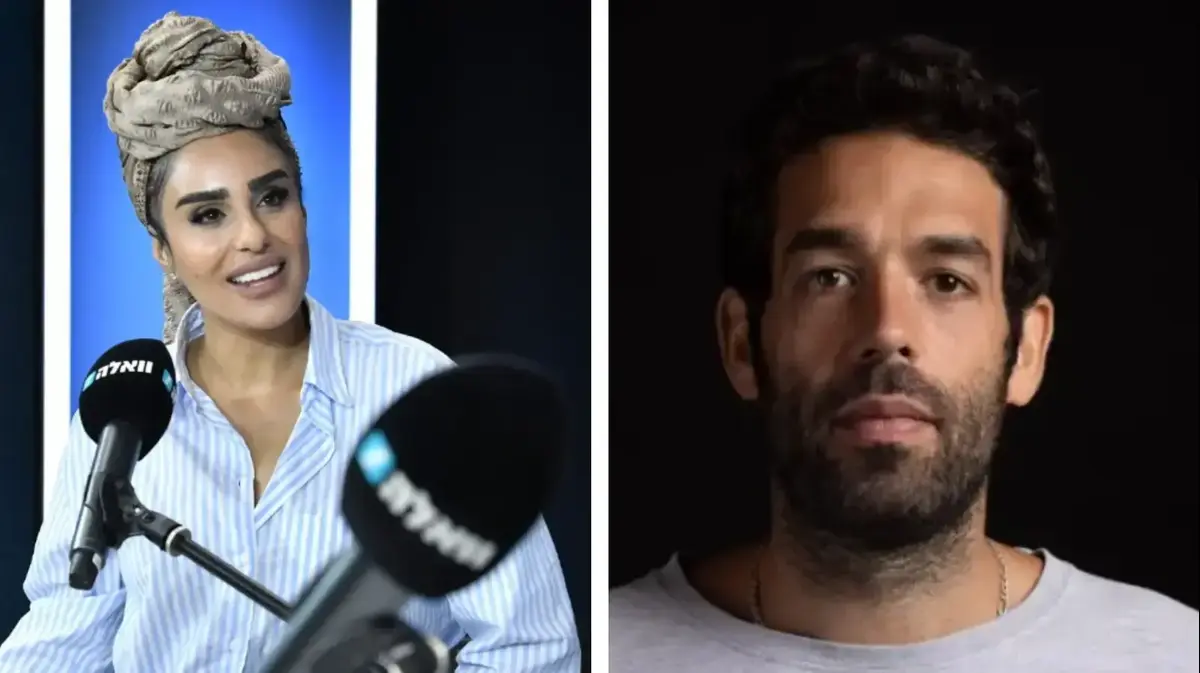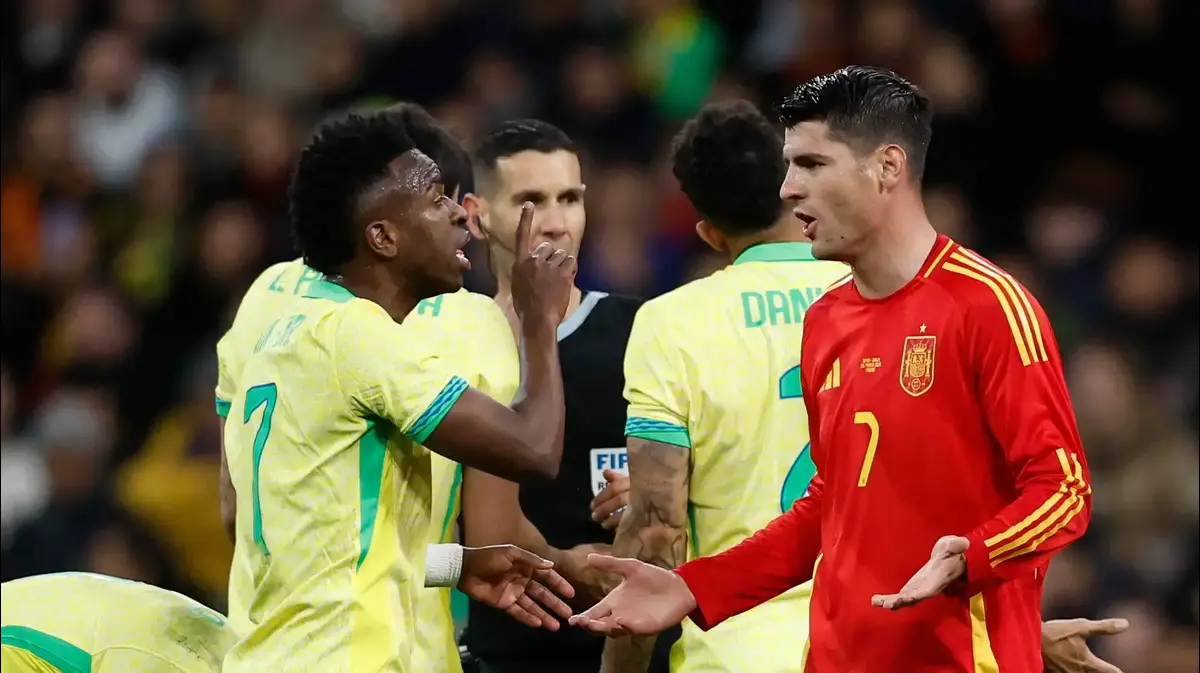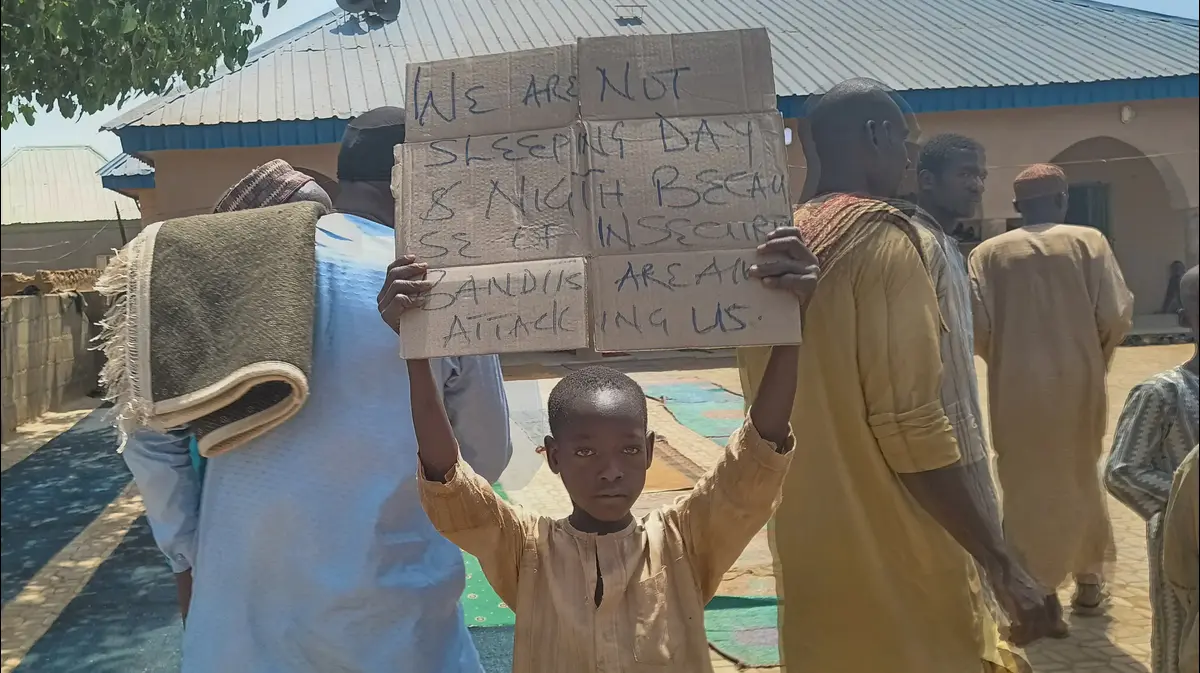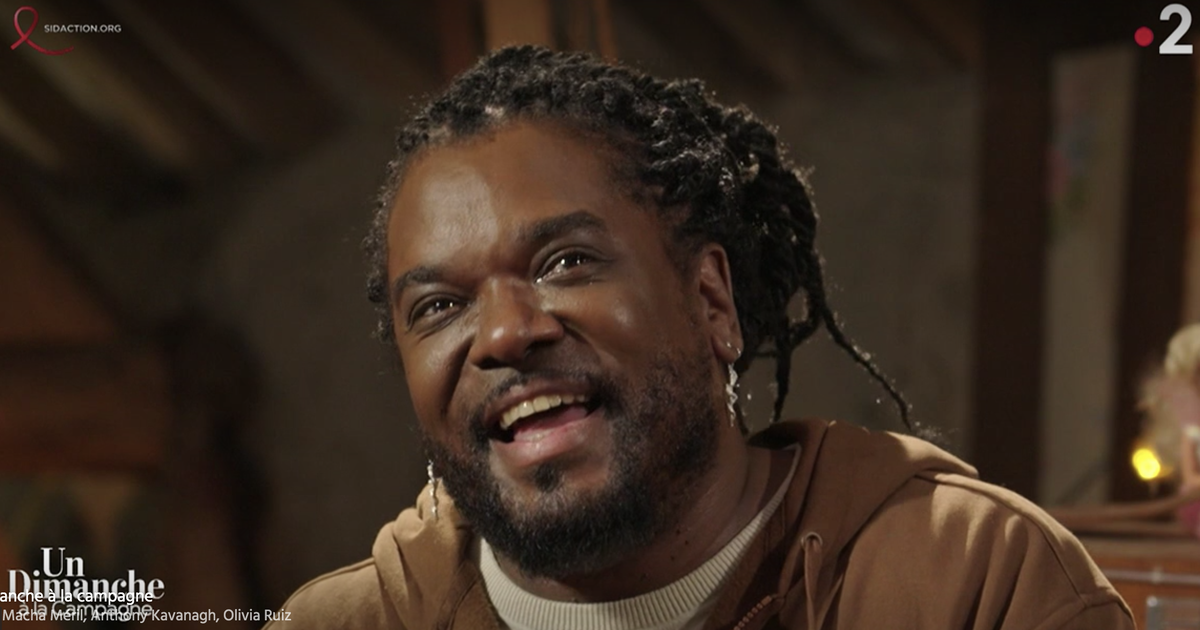Special synergy. Tuna and Ravid Plotnik at Live Park in Rishon LeZion (Photo: Ariel Efron)
In 2003, after a decade of complete separation, Paul Simon and Art Garfunkel returned to performing together. They embarked on a record-breaking tour around the world, which was also documented in a documentary. At a concert at Madison Square Garden in their hometown of New York, Art turned to Paul and told him, "For decades we've been 'Simon and Garfunkel,' I think it's time they called us 'Garfunkel and Simon.'" Paul, without hesitation at all, responded: "Go for it." The audience was torn with laughter.
It's funny because we can't even imagine it any other way. The name "Garfunkel & Simon" sounds strange to us not only because we have become so used to the original name, but because Simon was clearly the dominant character in the duo. He is the one who wrote and composed all the songs and plays musical instruments. No wonder that after the duo broke up, only Paul went on to a successful solo career. It only makes sense for his name to appear first.
With this in mind, it's hard not to wonder who decided that the big show that took place last night at Live Park in Rishon LeZion is called "Tuna and Ravid Plotnik" and not "Ravid Plotnik and Tuna." Was it an arbitrary decision? Did the two toss a coin? Maybe it was a marketing decision? Has anyone done a survey? Hired a focus group? Or maybe no one even dealt with it and just some PR guy put out the press release without thinking too much and that's how we got stuck with that name.
This is supposedly an unimportant point, but it needs to be dwelled on just to make it clear that this may be the only thing that flawed the evening that tended towards perfection. Beyond the terrible location (how long will producers continue to abuse the audience and schedule performances at this terrible facility?!), the only negative criticism that can be given to the show itself comes down to its title. The name "Tuna and Ravid Plotnik" simply failed to convey the magnitude of the event. You might mistakenly think that this was a performance by two artists who simply decided to double their commercial power, join forces and share the profits - but in practice this is a rare case of cooperation that creates a special synergy. Two talented artists, two full bands, and a whole that is greater than the sum of its parts.
More in Walla!
Poliker like you've never seen before, and the next Nakba storm: The Best of Docaviv
See full article >
A milestone in the musical development of both. Tuna and Ravid Plotnik at Live Park in Rishon LeZion (Photo: Ariel Efron)
Unions are not uncommon in the swamp of Israeli music. Shalom Hanoch and Shlomo Artzi went on a joint tour, Hanoch also did it with Matti Caspi, who himself did a nostalgic tour with Ricky Gal. Rita and Rami Kleinstein didn't let the divorce hurt them in the couple's show; Aviv Geffen and Aviatar Banai appeared together against all logic; The latter's late brother, Meir, went on tour with Arkady Duchin, and even Nurit Galron and Yehudit Ravitz put on a surprising joint show.
In the hip-hop world, in Israel and around the world, reunions are quite common, and sometimes even negligible. No wonder the joke around this show was, "What, Tuna and Ravid Plotnik performing together? I thought it was the same person." Gigi. And in any case, the show of Tuna and Ravid Plotnik turned out to be a completely different beast, which does not clearly resemble standard reunions in the genre.
Even if on paper it seems at first like a very good way to make money (and they honestly earned every penny, without the evil eye, with a two-and-a-half-hour show without taking their foot off the gas), the total combination of forces between the two is simply a milestone in the musical development of the two talented artists - and perhaps of all Israeli music. These are two artists at the peak of their power, who really don't need a marketing gimmick to sell tickets. These are two of the most successful singers in Israel today, if not the most successful, who proved last night that they can collaborate without a drop of ego - and enrich their joint work with great pride. Plotnik sang Tuna's songs, and vice versa. Almost every poem became a duet, and those who did not know otherwise - could not believe that this is not what the poet originally intended.
More in Walla!
100 Shades of Spring
See full article >
Thousands of tough guys started to tear up together. Tuna and Ravid Plotnik at Live Park in Rishon LeZion (Photo: Ariel Efron)
If an alien had landed in Live Park yesterday, he wouldn't have known that "All This Time" was a Plotnik song or that "Hey Babe" was a Tuna song. Just as he couldn't have known that "Sahara" and "Coffee and Cigarette" were two different songs, not one song with several verses coming together brilliantly. The arrangements and musical production flowed so smoothly that even those who knew all the songs might have been confused.
As befits the genre, the man with the microphone attracts all the attention - but those who stopped and looked at the stage in its entirety managed to notice some magical moments. For example, while Plotnik simply exploded on stage with "Dizziness," perhaps the strongest of the songs on Tuna's second album, Tuna could be seen looking at him from behind with admiration, as if he wasn't the one who wrote the song. Ten musicians stood on stage giving work, but in the background, without a microphone or musical instrument, Tuna sang the song to himself as if he were alone in the world and not surrounded by 15,<> fans. He closed his eyes, as if he were in a world of his own, and finally opened his eyes and looked at the whole scene like a bystander, examining the reactions of the thousands who filled Hampi like a proud father.
Later, the two will perform a moving acoustic rendition of Plotnik's "My Atonement" and immediately afterwards continue with the peak of emotion to "New Day." The song, dating back to the time Plotnik was called Nechi Nech, talks about the dreams of the rapper group who hope to conquer the world "someday." That day, it seems, has arrived. The song was performed in a minimalist manner by Plotnik, Tuna and Nir Danan, who co-wrote the song with Jimbo Jay. The audience sang with them the words that suddenly became prophetic: "And maybe you remember, how we laughed at everything, and dreamed big. I will never forget, even when there wasn't much, we had everything. Yesterday was yesterday, today is a new day." At this moment, Tuna shed his vocal persona, and returned to simply being the child with whom Zevulun develops hope. At that moment, he could no longer hold back the tears.
Something about the contrast between the rapper's tough character and the ponytail breaking down in tears should seem strange to us, but it's not. Not at all. Quite the opposite, even. In the midst of an evening full of emotion and beauty, it felt awfully natural. Thousands more such "tough guys" began to tear up along with him in the audience. Adults, young people, religious, secular. Israelis who are connected to this place and the difficult period it is going through, but know how to put everything aside in order to connect to the fulfillment of a collective dream. Maybe that's when tuna will stop being tuna and become simple with me. His audience is ready for it.
More in Walla!
"60-year-old women come up to me and say, 'Wow, what a song you wrote. My sister can't stand my divorce either.'"
See full article >
You can't argue with the authentic revolution they're leading. Tuna and Ravid Plotnik at Live Park in Rishon LeZion (Photo: Ariel Efron)
It was the emotional tour de force of the show, but musically it's hard to pinpoint a single record. The two took the stage, started as strong as possible, and slowly stepped up. It's a cliché, but sometimes the clichés are true. Like the joint performances of Arik Einstein and Shalom Hanoch in 1979, or the "Behind the Sounds" by Matti Caspi and Shlomo Gronich at the height of their creative flourishing in 1971, Plotnik and Tuna's six performances may turn out to be historic in retrospect. The music is different, you can even argue about the quality, but you can't argue with the authentic revolution that Zevulun and Plotnik are leading. One can only hope that the Arabs raised are documented qualitatively, so that future generations, as well as people who exclude themselves from the terrible amphitheater in Rishon LeZion (and with absolute justice) can enjoy the great cooperation of 2023, if not of the entire decade.
- culture
Tags
- tuna
- Ravid Plotnik
- show

